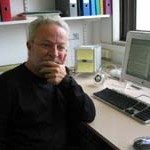Lien vers Pubmed [PMID] – 2089530
Res. Immunol. 1990 Oct;141(8):711-21
The hypothesis that self-tolerance to F protein antigen exclusively concerns T cells was tested by determining the frequencies of B lymphocytes producing anti-F antibodies in bone marrow (BM), spleen and peritoneal exudate (PEC) cells from normal, immune or tolerant animals, and in responder and non-responder mouse strains. Using an ELISA spot assay and lipopolysaccharide stimulation, we found that anti-F frequencies were highest in BM and “naturally activated” large spleen cells, followed by resting spleen and PEC cells. Anti-F specificities were also induced among “natural” Ig-secreting cells of normal individuals. Specific immunization of responder mice doubled the splenic frequencies, while tolerization had no effect. Similar results were obtained in BALB/c and A/J mice, while C57BL/6 contained fewer anti-F B cells in spleen, but not in BM. These results support the notion that self-tolerance to F antigen can primarily be ascribed to T cells, but they also show F-antigen-specific selection of B-cell repertoires.
